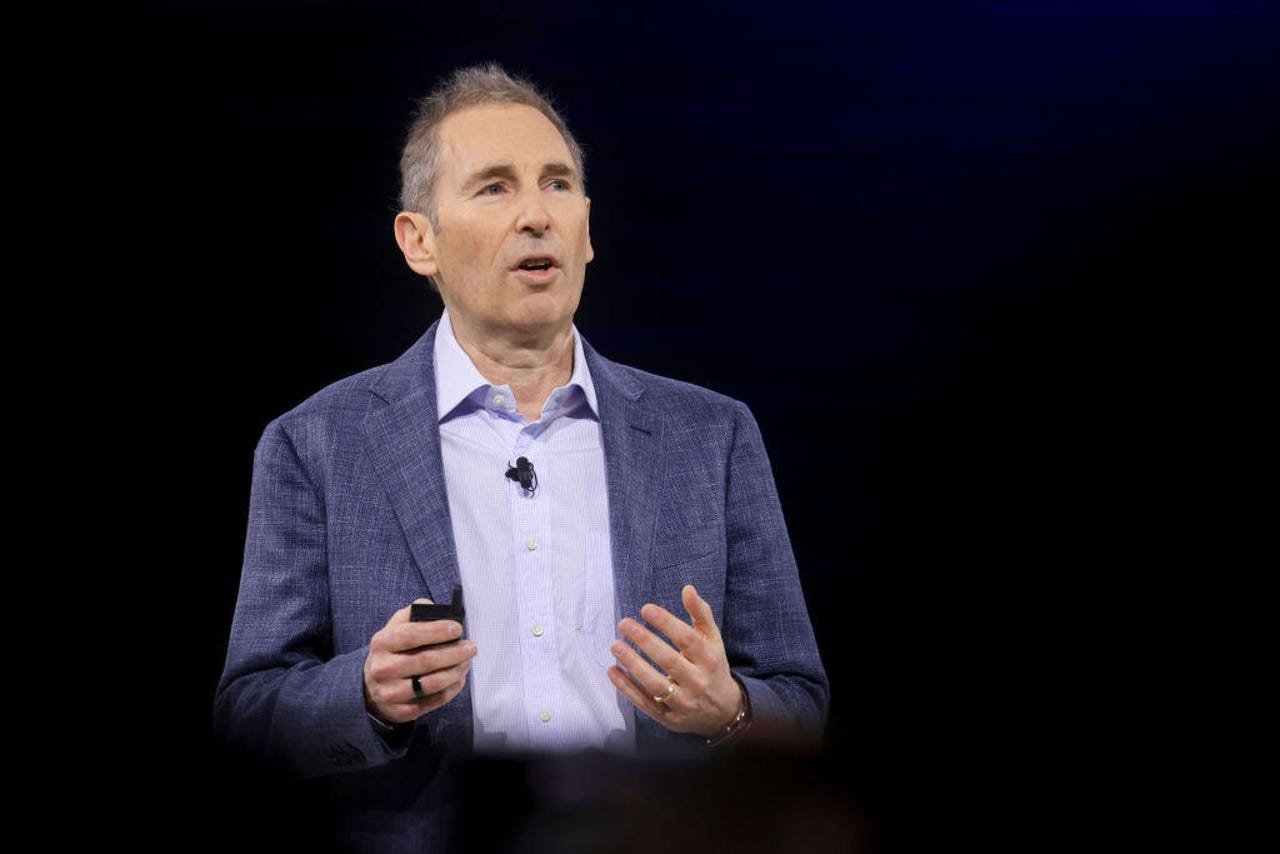Tools & Platforms
Amazon’s Andy Jassy says AI will take some jobs but make others more ‘interesting’

The adoption of artificial intelligence systems throughout the business sector will lead to “fewer people doing some of the jobs” that become automated, Amazon president and CEO Andy Jassy said in an interview with CNBC’s Jim Cramer this week.
Jassy’s understated comments about the future impacts of automation upon the job market were also optimistic: While he concedes that some people will be replaced by AI, the technology will simultaneously “make all of our jobs more interesting ” and lead to new roles.
“We’re going to hire more people in AI, more people in robotics, and there will be other jobs…that we’ll hire [for] over time, too,” he told Cramer.
Also: You’ve heard about AI killing jobs, but here are 15 news ones AI could create
Such reassurances have become the norm among leaders of the major tech firms, as fears of AI-fueled job displacement continue to percolate.
In a blog post published last month, for example, OpenAI’s Sam Altman wrote that while AI will cause “whole classes of jobs” to disappear, this will ultimately be worthwhile thanks to the massive and widespread wealth the technology will supposedly generate. And in a recent episode of the podcast Hard Fork, Google DeepMind CEO Demis Hassabis said the company has “no plan” to hire fewer engineers next year than it has this year.
The human cost
Like every other major tech company, Amazon has been investing heavily in AI. In February, the company unveiled Alexa+, its new AI-powered assistant. Last month, it announced the general launch of its Video Generator platform, which allows advertisers to create simple video ads from still images of products. And just last week, the company announced the launch of DeepFleet, a new foundation model designed to coordinate and streamline the behavior of its huge fleet of fulfillment center robots.
The company’s escalating embrace of AI comes with a human cost. Foreshadowing the statements he’d later make to CNBC, Jassy told Amazon employees in a memo last month that AI will make some of the company’s jobs redundant, while simultaneously creating more demand for human labor in certain job categories.
“It’s hard to know exactly where this nets out over time,” Jassy wrote in the memo, “but in the next few years, we expect that this will reduce our total corporate workforce as we get efficiency gains from using AI extensively across the company.”
Also: Phishers built fake Okta and Microsoft 365 login sites with AI – here’s how to protect yourself
Amazon has laid off around 27,000 workers since early 2022 as Jassy continues to look for ways to cut company expenditures, CNBC reported in May. Microsoft will also reportedly lay off around 4% of its global workforce — consisting of about 224,000 employees as of last month — as the company ratchets up its AI spending.
Agents ascendent
Jassy explicitly mentions AI agents in both the CNBC interview and his internal memo as a particularly potent application of AI.
Unlike more limited chatbots, agents are able to autonomously formulate plans, coordinate with one another, and use digital tools like web search in order to achieve their goals.
Also: What are AI agents? How to access a team of personalized assistants
Leading tech companies have been promoting agents with considerable gusto in recent months, an effort fueled in part by a need to show tangible returns to investors following massive investments in AI research and development. It seems to be working: A recent survey of 500 tech leaders conducted by accounting firm Ernst & Young found that close to half of all respondents are actively integrating AI agents across their organizations.
The same survey also found that 84% of tech leaders are planning on expanding their workforce over the next six months.
Want more stories about AI? Sign up for Innovation, our weekly newsletter.
Tools & Platforms
Somalia, Saudi Arabia Sign Pact on AI and Space Technology

Somalia and Saudi Arabia signed an agreement in Riyadh to cooperate on regulating artificial intelligence and space technology.
The deal was concluded during the Global Symposium for Regulators (GSR-25) by Mustafa Yasin Sheikh, head of Somalia’s National Communications Authority, and Haitham Al-Ohaly, governor of Saudi Arabia’s Communications, Space and Technology Commission.
Officials said the partnership will promote regulatory cooperation, knowledge sharing, and frameworks for responsible growth in AI and space sectors. The two nations also plan to explore infrastructure sharing and broader digital collaboration.
The GSR-25, co-hosted by the International Telecommunication Union and Saudi Arabia, brought together representatives from more than 190 countries to address global digital challenges.
Tools & Platforms
South Africa Moves to Establish National AI Network of Experts

The Tshwane University of Technology (TUT) joined government, academia, and major tech firms in Pretoria on Aug. 7 to discuss creating South Africa’s National Artificial Intelligence Network of Experts.
The forum, convened by Deputy Minister of Communications and Digital Technologies Mondli Gungubele, will guide sectoral implementation of the country’s forthcoming AI policy. The Draft National AI Policy aims to help South Africa harness opportunities, mitigate risks, and maintain sovereign control over AI development while aligning with global standards.
Representatives included Microsoft SA, Meta, the Council for Scientific and Industrial Research, the Human Sciences Research Council, Research ICT Africa, the Central University of Technology, and the South African Local Government Association.
Prof. Anish Kurien of TUT stressed academia’s role in translating research into public policy, while counterparts highlighted AI’s potential to transform services, skills, and governance. Gungubele called AI “a general-purpose technology akin to electricity or the internet” with the power to drive inclusion across sectors.
Once adopted, South Africa will join Morocco, Mauritius, Rwanda, and Senegal as African countries with national AI strategies.
Tools & Platforms
How Mastercard’s (MA) AI-Powered Payments Push and Tech Partnerships Have Changed Its Investment Story

-
In the past week, Mastercard announced a suite of AI-powered payment products and developer tools, expanded consulting services, and new collaborations with global technology leaders such as Stripe, Google, and Ant International, supporting a rollout of its Agent Pay program to all U.S. cardholders by the end of the holiday season.
-
This initiative positions Mastercard at the forefront of advancing secure, intelligent commerce by making AI-enabled payments and agentic capabilities accessible and scalable for digital merchants and platforms worldwide.
-
We’ll now examine how Mastercard’s push into AI-powered payments and its collaborations with technology partners could reshape its investment narrative.
These 10 companies survived and thrived after COVID and have the right ingredients to survive Trump’s tariffs. Discover why before your portfolio feels the trade war pinch.
If you’re a Mastercard shareholder, you likely believe in the ongoing digital shift in payments, the company’s powerful network effects, and its ability to grow by expanding into new revenue streams like AI-powered services. The recent launch of AI tools and expanded partnerships has the potential to support growth drivers, especially deeper collaboration with tech partners for value-added services, but the most important short-term catalyst remains increasing digital and e-commerce transaction volume. For now, these AI announcements don’t fundamentally alter the biggest risk: faster adoption of alternative payment rails in key emerging markets.
Among the recent announcements, the release of Mastercard’s On-Demand Decisioning (ODD) stands out. This solution offers financial institutions more direct control and flexibility over transaction approvals, supporting the broader catalyst of helping partners automate, personalize and scale digital payments. As Mastercard continues to expand its value-added services beyond core payments, such tools could help reinforce its differentiated service offering.
However, investors should be aware that while Mastercard accelerates innovation, an even faster shift by consumers and merchants to alternative payment options could…
Read the full narrative on Mastercard (it’s free!)
Mastercard’s outlook anticipates $42.6 billion in revenue and $19.9 billion in earnings by 2028. This requires a 12.1% annual revenue growth rate and a $6.3 billion increase in earnings from the current $13.6 billion.
Uncover how Mastercard’s forecasts yield a $644.55 fair value, a 11% upside to its current price.
-

 Business2 weeks ago
Business2 weeks agoThe Guardian view on Trump and the Fed: independence is no substitute for accountability | Editorial
-
Tools & Platforms1 month ago
Building Trust in Military AI Starts with Opening the Black Box – War on the Rocks
-

 Ethics & Policy2 months ago
Ethics & Policy2 months agoSDAIA Supports Saudi Arabia’s Leadership in Shaping Global AI Ethics, Policy, and Research – وكالة الأنباء السعودية
-

 Events & Conferences4 months ago
Events & Conferences4 months agoJourney to 1000 models: Scaling Instagram’s recommendation system
-

 Jobs & Careers2 months ago
Jobs & Careers2 months agoMumbai-based Perplexity Alternative Has 60k+ Users Without Funding
-

 Podcasts & Talks2 months ago
Podcasts & Talks2 months agoHappy 4th of July! 🎆 Made with Veo 3 in Gemini
-

 Education2 months ago
Education2 months agoMacron says UK and France have duty to tackle illegal migration ‘with humanity, solidarity and firmness’ – UK politics live | Politics
-

 Education2 months ago
Education2 months agoVEX Robotics launches AI-powered classroom robotics system
-

 Podcasts & Talks2 months ago
Podcasts & Talks2 months agoOpenAI 🤝 @teamganassi
-

 Funding & Business2 months ago
Funding & Business2 months agoKayak and Expedia race to build AI travel agents that turn social posts into itineraries

